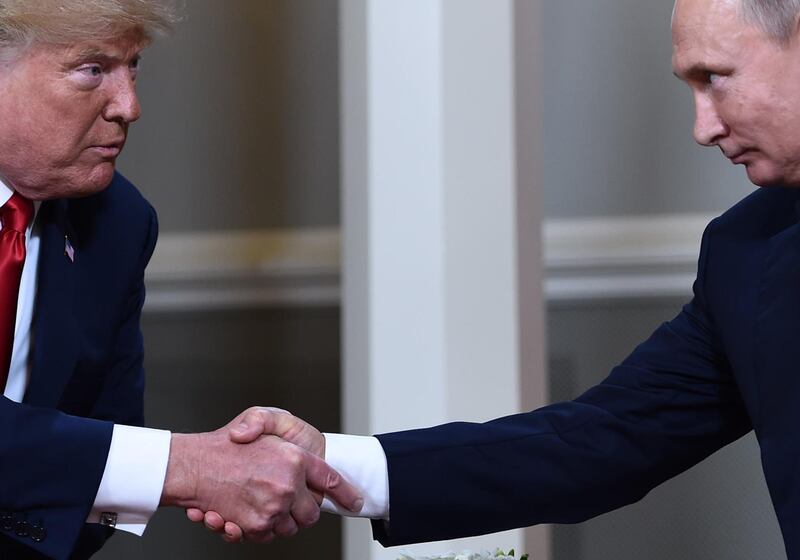The most significant casualty of Donald Trump's car crash of a summit with Vladimir Putin is undoubtedly the damage it has done to the American president's credibility. And nowhere will the erosion of the American leader's global standing be more keenly felt than in the Middle East, where trust in Mr Trump's ability to deliver a fair and comprehensive peace deal will now come under intense scrutiny.
Mr Trump’s decision to arrange a summit with the Russian president was always going to be laced with controversy, not least because it took place at a time when American investigators were in the process of naming a number of Russian military intelligence officers whom they believe to be responsible for attempting to influence the outcome of the 2016 presidential election contest.
With the very foundations of American democracy under attack, arranging a summit with Mr Putin, the man widely believed to have been responsible for orchestrating the plot, was a high stakes roll of the dice. But when Mr Trump, in his joint press conference with the Russian leader, appeared to suggest that he accepted Mr Putin's denial of any involvement, the American president managed to cause profound offence to the entire American intelligence and security establishment, whose own painstaking inquiries point unequivocally to the Kremlin's culpability.
Mr Trump has since back-tracked on his bizarre performance in Helsinki, claiming that he misspoke when responding to a question at a press conference. But
No matter how hard Mr Trump tries to make amends - and the aggressive manner of his apology suggests it is really nothing of the kind - the president has done himself a serious disservice, both in terms of his stature as America’s commander-in-chief and his reliability in the eyes of his allies.
In Europe, the primary focus of Mr Trump's week-long visit, politicians were left scratching their heads about how best to follow the American president's lead. Should they, as Mr Trump lectured during the Nato summit in Brussels, spend more on defence to enable them to be better prepared to deal with Russian aggression? Or should they ditch their long-standing wariness of Mr Putin and embark on a new policy of rapprochement with the Kremlin?
The Middle East is another region that traditionally looks to Washington for strong leadership but, with Mr Trump seemingly giving off contradictory signals as to his true intentions, questions will inevitably be raised about the Trump administration’s approach to a number of issues.
________________________
Read more from Opinion:
[ HA Hellyer: One joke at a time: how the Arab world is (slowly) tickling its funny bone ]
________________________
After the woeful neglect the region suffered under former US President Barack Obama, expectations were raised among pro-Western regimes in the Middle East that the arrival of Mr Trump at the Oval Office would result in a revival of American influence. And, in some respects, Mr Trump’s presidency has already had a profound impact on a number of key issues. His more pro-active leadership of the campaign to defeat ISIS helped to achieve the decisive breakthrough in Mosul and
Raqqa, and his decision to launch air strikes against the Assad regime for resorting to chemical weapons had a salutary impact. The President’s decision to withdraw from the flawed Iranian nuclear deal has also generated broad support from Washington’s Arab allies, while sending a clear signal to Tehran that its constant meddling in the affairs of Arab states will no longer be tolerated.
Doubts will now be raised, though, about the strength of Mr Trump's commitment to America's allies in the wake of the Helsinki summit, where Mr Trump's main priority appeared cosying up to Mr Putin than defending the interests of America's allies. And nowhere was this more apparent than in Mr Trump's passing reference to Syria's seven-year-old civil war during the Helsinki press conference.
Having twice launched military action against the Assad regime, Mr Trump had created the clear impression that he regarded Syrian dictator Bashar al-Assad as the head of a hostile state. And yet, we now have Mr Trump backing a Russian-backed peace deal to end the Syrian conflict which envisages the survival of the Assad regime, a prospect that seemed unthinkable only a few months ago.
And if Mr Trump is able to conduct a complete volte face on such an important issue as Syria, what is to say he might not be tempted to change his mind on other regional challenges, such as Iran and attempts to resolve the long-running Israeli-Palestinian saga?
The Trump administration is currently in the process of putting the finishing touches to its long-awaited Middle East peace plan, by all accounts an ambitious and comprehensive document that seeks to implement a broad programme of economic development throughout the Arab world in return for resolving the Israel-Palestine dispute. Early drafts of the proposal, said to be the work of Mr Trump’s son-in-law Jared Kushner, are now being circulated around the region to countries, such as the Gulf states, that have a vested interest in a positive outcome.
Given the strong emotions that are generated by the Israeli-Palestinian issue, both sides will need to be able to trust the Trump administration to arrive at a fair and equitable settlement. But the ability of Mr Trump to act as an honest broker on this and the many other issues that dominate the region must now be open to question in view of the ease with which Mr Trump ditched one American policy - namely overthrowing the Assad regime - in favour of one that was the exact opposite: allowing Mr Al Assad to remain in power.
For, if Mr Trump can reverse his position on an issue as important as the future of the Syrian regime, there is nothing to stop him having a sudden change of heart on other major issues, such as the creation of a homeland for the Palestinians.
Con Coughlin is the Daily Telegraph's defence and foreign affairs editor





